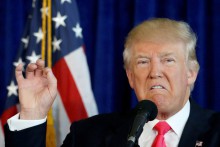The US presidential campaign is gathering momentum and growing ever more scandal-ridden. Until recently, the candidate of the Republican Party (also known as the Grand Old Party, or GOP) Donald Trump was gaining points through blowing up the email scandal involving his Democrat rival Hillary Clinton, who, being in the position of secretary of state, used a private server for work and thus allegedly threatened the national security of the US.
But lately, the New York billionaire made a number of controversial statements himself during a broadly-themed press conference on July 27, which can also be seen as a threat to US national security. Trump addressed Russian hackers, who are effectively a front for that country’s security agencies, with the following words: “It would be interesting to see – I will tell you this, Russia, if you are listening – I hope you are able to find the 30,000 emails that are missing. I think you will probably be rewarded mightily by our press.” It is known that Clinton did not provide these messages to investigators because they allegedly contained private information.
Understandably, the American media and representatives of the Democratic Party immediately reacted to this statement of the Republican candidate. In particular, former head of the CIA Leon Panetta said in an interview that it was “totally outrageous” to hear the Republican presidential candidate expressing hopes that Russia finds emails Clinton deleted from a private server she used when serving as secretary of state.
“You have got now a presidential candidate who is in fact asking the Russians to engage in American politics. I just think that is beyond the pale. That kind of statement only reflects the fact that he truly is not qualified to be president of the United States,” said Panetta who supports Clinton in the race for the White House.
“Absolutely incredible. Can’t remember a time when any American encouraged Russian espionage,” former US Ambassador to Russia Michael McFaul reacted on Twitter.
Senior fellow at the Brookings Institution and former US Ambassador to Ukraine Steven Pifer said in a comment for The Day: “It is truly bizarre when one American presidential candidate calls on a hostile foreign intelligence agency to hack and release the emails of his opponent. I cannot believe that this will sit well with many American voters.”
Meanwhile, Salon was much harsher in its criticism of the New York tycoon over this statement and published an article entitled “Donald Trump vs. America: The GOP presidential nominee explicitly asks Russia to violate our national security.” According to the publication, Trump’s appeal to Russia to steal Clinton’s emails is pure madness, and the Republicans have to answer for it.
“This is legitimately scandalous. It is the sort of comment that ends political careers. Republicans who back Trump have to stake out a position on this and let the public know whether they support the Republican presidential nominee’s endorsement of foreign espionage against the United States,” writes Salon.
At the already-mentioned press conference, Trump made another scandalous statement about the possibility of recognition of Crimea as part of Russia and the lifting of sanctions in case of his entry to the White House. It is reported that German journalist Mareike Aden asked him whether a President Trump would recognize Crimea as Russian and lift sanctions imposed on the Kremlin after its 2014 illegal annexation of the Ukrainian territory. The candidate’s reply was as follows: “Yes. We would be looking at that.”
On Twitter, Pifer commented on the billionaire’s scandalous response thus: “Trump would consider lifting sanctions on Russia & recognizing illegal annexation of Crimea. No wonder he is Kremlin’s favored candidate.”
COMMENTARY
Adrian KARATNYCKY, member of the US Atlantic Council, Washington:
“Russia is a rival and security threat to the US and its allies. Trump’s call for Russia to share information hacked or stolen from a US citizen, a former government official, and a presidential candidate is, therefore, unprecedented in the post-WWII era. It indicates that Trump is seeking to change the post-Cold War order and to drastically revise and destabilize the security arrangements and understandings that have prevailed for seven decades. His recent comments in which he has also eroded the US commitment to NATO allies and left open recognition of Russia’s illegal occupation of Crimea (a violation of the UN Charter and international law), is a further sign of the instability his election would inject into the world. We hope that all these comments will alienate the many millions of Ukrainian, Polish, Czech, and Baltic voters in sun key states as Pennsylvania, Ohio, Wisconsin, and New Jersey, where the election and the fate of the unified West will be determined.”








